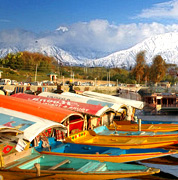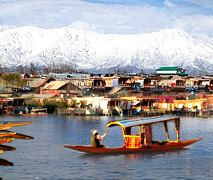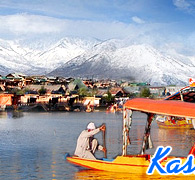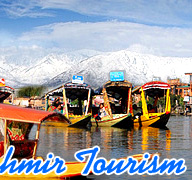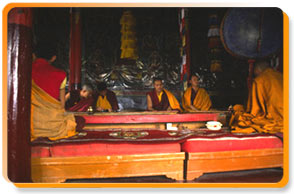 Monasteries in Ladakh may belong to either the
Mahayana or the Hinayana sect of Buddhism but they play an important
role in lending the region its unique flavor. Commonly known as Gompas
in the region, besides being beautiful, these monasteries can often be
seen perched dangerously on the edge of craggy mountain faces or lone
rocks. The head lama is called a 'kushak', which means a Reincarnation.
Monasteries in Ladakh may belong to either the
Mahayana or the Hinayana sect of Buddhism but they play an important
role in lending the region its unique flavor. Commonly known as Gompas
in the region, besides being beautiful, these monasteries can often be
seen perched dangerously on the edge of craggy mountain faces or lone
rocks. The head lama is called a 'kushak', which means a Reincarnation. Likir Monastery
52 km from Leh, it was founded in the 11th century by a sect known as Klu-Kkhjil (water spirits) and was rededicated to another monastic order (the yellow sect) in the 15th century. The original Gompa was destroyed in a fire and the present-day Gompa was rebuilt in the 18th century. It is home to huge clay images of Lord Buddha, several old manuscripts, a rich collection of Thankas, old religious and domestic costumes, implements and other such things. It is said to flourish in the 15th century under lhawang Lodos Sangphu. Today, the monastery also belongs to Gaylukpa School. An annual festival is held from the 17th to 19th of the twelfth month, known as Likir festival.
Spituk Monastery
18 km from Leh, Spituk Gompa is on the hilltop near River Indus. Od-De founded the Gompa in 11th century and was called Spituk (exemplary) by Rinchen Zangpo, a translator that visited the place. Initially it belonged to the Kadampa School but during the reign of King Gragspa Bumide, he transferred it to Gayluk Pa order. The monastery has a rich collection of ancient masks, antique arms, icons and numerous Thankas. An annual festival, known as the Spituk festival, is held here from 17th to 19th days of the eleventh month. There is another shrine, higher up the hill, known as the Mahakal Temple, dedicated to the deity of Vajrabhairava. It has a frightening face, which is unveiled only during the annual festival in January.
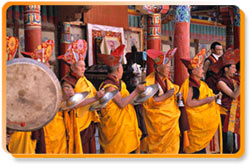
It is the largest monastery in Ladakh, Hemis belongs to the red sect, Brokpa. Built in 1630, 45 km south from Leh, it is not only impressive and intriguing but also different from the other important monasteries of Ladakh. An annual festival is held for two days in June-July in the courtyard of the monastery to commemorate the birth anniversary of Guru Padmasambhava. The festival features dances and a colorful pageant where good triumphs over evil along with an annual 'bazaar' where Ladakhis from remote areas come to buy and sell wares.
Cave Monastery
The Cave Monastery of Shergole is old and small but has elegant frescoes. A peculiar Buddhist monastery of the region, it juts out of a brown, granite cliff and is frighteningly suspended in the middle of the mountain. The architectural oddity of the monastery along with its thrilling views arouses the curiosity of not only the tourists but also the locals and it is a perfect thing that one would want to take a photograph of, as a memento to keep forever.
Lamayuru Monastery
125 km west of Leh, Lamayuru monastery was founded in the 10th century. According to a popular folktale, Lamayuru was once a lake. A Lama once blessed the place so that it caused the waters of the lake to recede up to the mountains and left the place for the monastery to be built. This monastery is in utter ruins and only its main hall stands to this day housing numerous Tankhyas. The Yundrung Kabgyad festival is held here annually during summer on the 28th and 29th days of the second Tibetan month. Lamayuru has some fascinating caves carved out of the mountainside and is set on a high cape overlooking the village and valley. The monastery is also known as Yung Drung (meaning 'Swastika') and is worth seeing, if only for its beauty that surmounts that of any other gompa of the region.
Alchi Gompa
Situated on the shores of the River Indus, Alchi Gompa is more than thousand years old. One of the walls of the monastery features thousands of miniature paintings of the Buddha along with three large sized images that are made of clay and have been painted brightly to be the highlights of the place. However, this place does not serve as active religious center anymore and monks only look after it from the Likir.




